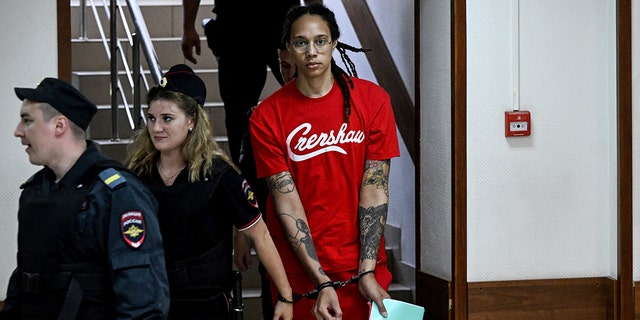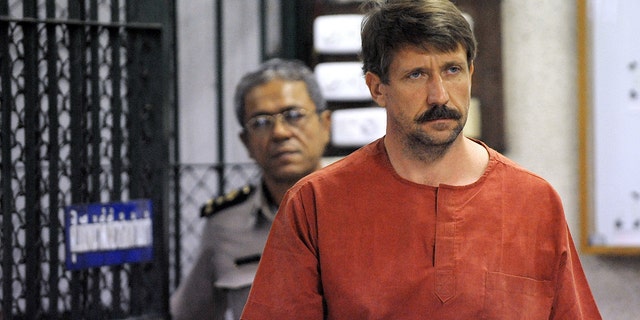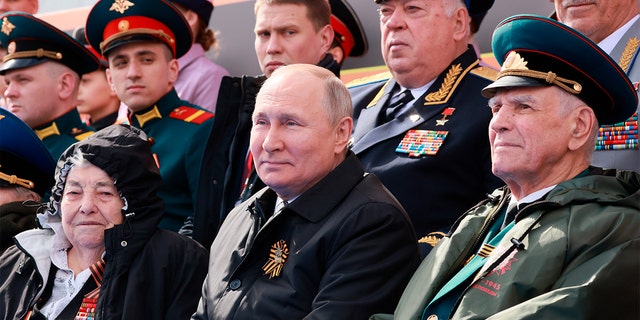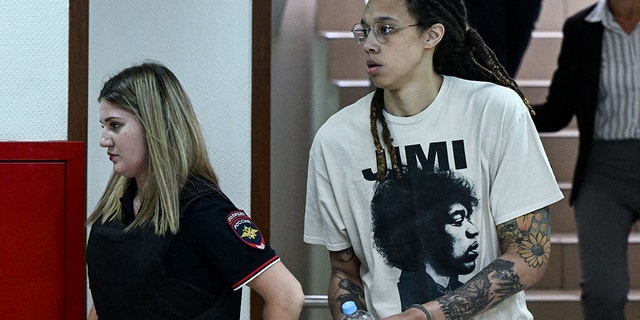Brittney Griner pleads guilty in Russia, but experts warn next steps may have serious consequences
Brittney Griner pleaded guilty to a drug-smuggling charge on Thursday after months of being held in Russian detention – and now, experts say gaining her release in a potential prison swap could turn out to be a complex process with serious implications.
During her appearance in court, Griner maintained that her “intent” was not to violate Russian law. She could face up to 10 years in prison.
“I’d like to plead guilty, your honor. But there was no intent. I didn’t want to break the law,” she said, adding that she will give her testimony at a later date.
A verdict has not been ruled in her case but talks of a prisoner swap for Griner, who the State Department has maintained was wrongfully detained, have been the focus of conversations as her trial continues.
BRITTNEY GRINER ‘DECIDED TO TAKE FULL RESPONSIBILITY FOR HER ACTIONS’ WITH GUILTY PLEA, LEGAL TEAM SAYS
Hugh Dugan, an American academic and longtime diplomat who served as the Special Presidential Envoy for Hostage Affairs under the Trump administration, told Fox News Digital that Griner’s guilty plea further complicates her release as it gives the Russian government more of a bargaining chip.
“This brings her closer to being identified as a sentenced convict with less than 1% chance of acquittal. There would be more wiggle room if she hadn’t gotten to this point, I think, and let the system drag it out and not classify her as such. But this, in my mind, can make her a more valuable resource for Russia, because now they can say we have a legitimate criminal under their law, and we have to be true to our system, etc.,” Dugan explained.

One of the names being reported as a possibility is Viktor Bout, a Russian arms dealer known as the “Merchant of Death,” who is serving a 25-year sentence in the U.S. after being convicted of conspiracy to kill U.S. citizens and providing aid to a terrorist organization.
Dugan explained that this scenario would not be considered “proportionate” based on the charges in each respective case.

“When we get to swapping something like this with a hardened terrorist, the proportionality is not the same. And that’s always a big concern in negotiation that we don’t devalue our person to the point where the next day that same country will take another one of our tourists and another American innocently walking around for the sake of leveraging against some major foreign policy asset that we hold of theirs.”
BRITTNEY GRINER PLEADS GUILTY TO DRUG CHARGES IN RUSSIA
That sentiment was echoed by Tom Schwartz, a distinguished professor of history at Vanderbilt University, who called a prison swap in a high-stakes case like this a “slippery slope.”
“This type of prisoner swap is a slippery slope, opening the opportunity for other kidnappings of Americans in other countries and the attempt by other nations to gain prisoner releases that way,” he told Fox News Digital.
Fox News contributor Dan Hoffman, a former CIA station chief, said on the “Fox News Rundown” podcast that the practice of pursuing a prisoner swap in cases like this is not a new strategy for the Kremlin.
“The United States has historically been induced to make these sorts of Faustian bargains with the Soviets or in this case, the KGB operative in the Kremlin, Vladimir Putin.”

Following news of Griner’s plea Thursday, Russia’s Deputy Foreign Minister Sergei Ryabkov criticized the U.S. government over its portrayal of the WNBA star’s case and the “hype” surrounding her detainment.
“We have a long-standing framework for discussing such issues. The attempts of the American side to stir hype in the public arena, to make noise regarding this topic are very clear, and they don’t help to the practical resolution of issues.”
Schwartz said that the comment made by Ryabkov signals that the Kremlin is well aware of the urgency behind Griner’s release.
“He’s positioning this and making it clear that Russia now recognizes, you might say, the value of Brittney Griner. I think this could be a bargaining position in the sense that by saying that the agitation is going to make it more difficult for her, he ups the pressure on the president to do something quickly to try and get her released since the agitation shows no sign of quieting. In this sense, the opportunities for quiet diplomacy in this particular case seem to have gone by the wayside.”

The Russian Foreign Minister said Wednesday that Griner will have the opportunity to appeal or apply for clemency once a verdict is given, but the real likelihood of that, while not certain, is grim.
“The Russian judicial system might enjoy giving her slightly less and taking some credit for showing some leniency, but I don’t think we’re talking about her being released,” Schwartz said. “Judging Vladimir Putin has proven to be a very mistake-filled passion on the part of Western analysts who thought he wouldn’t invade [Ukraine], thought he wouldn’t do this, and he does these things. So he might surprise us again.”
A resolution, in this case, will likely be a long and challenging process, Rebekah Koffler, a Russian-born former U.S. intelligence officer and expert on Russia and Vladimir Putin, told Fox News Digital.
“Putin’s government likely already sent their demands to Washington, either through official channels or back channels. But typically these cases are super hard to adjudicate because of the two legal systems… The U.S. side doesn’t consider Ms. Griner’s arrest as legitimate, even though a substance that’s illegal was found in her possession. The Russians insist that the arrest is legitimate, and they want the U.S. to acknowledge it. So it will be a battle of semantics in one sense that mirrors the Russia and U.S. confrontation over control of Ukraine.”

Ryabkov’s comments on Thursday only further solidify the battle that has yet to come.
“The tenacity with which U.S. Administration and representatives of relevant [government] structures in Washington call those who have been sentenced by us on serious charges and are awaiting appropriate verdicts, [as] “detained persons” is a reflection of Washington’s unwillingness to perceive the world adequately.”
Read the full article Here


